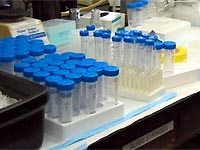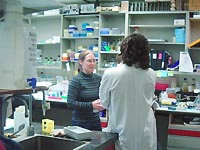 Biochemistry is the application of chemistry to the study of biological processes at the cellular and molecular level. It emerged as a distinct discipline around the beginning of the 20th century when scientists combined chemistry, physiology and biology to investigate the chemistry of living systems.
Biochemistry is the application of chemistry to the study of biological processes at the cellular and molecular level. It emerged as a distinct discipline around the beginning of the 20th century when scientists combined chemistry, physiology and biology to investigate the chemistry of living systems.
The study of life in its chemical processes
Biochemistry is both a life science and a chemical science - it explores the chemistry of living organisms and the molecular basis for the changes occurring in living cells. It uses the methods of chemistry, physics, molecular biology and immunology to study the structure and behaviour of the complex molecules found in biological material and the ways these molecules interact to form cells, tissues and whole organisms.
"Biochemistry has become the foundation for understanding all biological processes. It has provided explanations for the causes of many diseases in humans, animals and plants."
Biochemistry graduates are interested, for example, in mechanisms of brain function, cellular multiplication and differentiation, communication within and between cells and organs, and the chemical bases of inheritance and disease. The biochemistry student seeks to determine how specific molecules such as proteins, nucleic acids, lipids, vitamins and hormones function in such processes. Particular emphasis is placed on regulation of chemical reactions in living cells.
An essential science
 Biochemistry has become the foundation for understanding all biological processes. It has provided explanations for the causes of many diseases in humans, animals and plants. It can frequently suggest ways by which such diseases may be treated or cured.
Biochemistry has become the foundation for understanding all biological processes. It has provided explanations for the causes of many diseases in humans, animals and plants. It can frequently suggest ways by which such diseases may be treated or cured.
A practical science
 Because biochemistry seeks to unravel the complex chemical reactions that occur in a wide variety of life forms, it provides the basis for practical advances in medicine, veterinary medicine, agriculture and biotechnology. It underlies and includes such exciting new fields as molecular genetics and bioengineering.
Because biochemistry seeks to unravel the complex chemical reactions that occur in a wide variety of life forms, it provides the basis for practical advances in medicine, veterinary medicine, agriculture and biotechnology. It underlies and includes such exciting new fields as molecular genetics and bioengineering.
The knowledge and methods developed by biochemistry scientists are applied to in all fields of medicine, in agriculture and in many chemical and health related industries. Biochemistry is also unique in providing teaching and research in both protein structure/function and genetic engineering, the two basic components of the rapidly expanding field of biotechnology.
A varied science
As the broadest of the basic sciences, biochemistry includes many subspecialties such as neurochemistry, bioorganic chemistry, clinical biochemistry, physical biochemistry, molecular genetics, biochemical pharmacology and immunochemistry. Recent advances in these areas have created links among technology, chemical engineering and biochemistry.